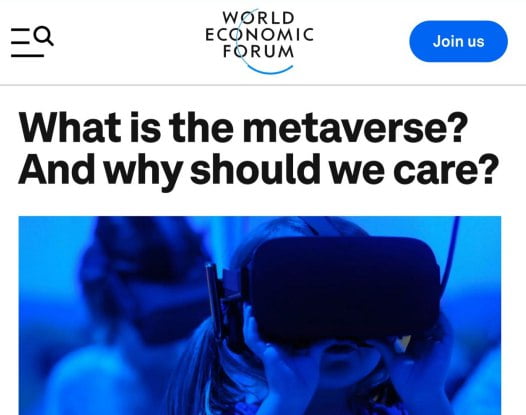In another blog I referred to the Metaverse and asked if the fact that the Elite’s plan to have microchips and electronic devices implanted in our bodies is a precursor to the metaverse. What is the Metaverse?
The usual same World Economic Forum has the answer for you. In its article dated 29thOctober 2021 entitled “What is the metaverse? And why should we care?”[1] the WEF explains that “the metaverse doesn’t exist –at least not yet. As of today there isn’t anything that could legitimately be identified as a metaverse. A useful parallel for understanding its maturity – with a hat-tip to technology analyst Benedict Evans for the reference – may be the story of when telecoms entrepreneur Craig McCaw[2]first heard about the internet.”
So the WEF guides us to their plan of the metaverse by telling us that a better question would be “what could become the metaverse”?
The WEF says that “Technologists would answer that the internet will eventually evolve into the metaverse which will come to represent the next major computing platform” adding that “the metaverse is also expected to have a strong connection with the real-world economy – and eventually become an extension of it… Simply put this means being able to build trade and invest in products goods and services.”
“To a certain extent this may rely on non-fungible tokens (NFTs) as the foundation for value creation. A NFT is a claim of ownership for a unique non-interchangeable digital asset that is stored on a blockchain. If NFTs become a commonly adopted tool for trading such goods they could help accelerate the use of XR ecosystems as places people go to combine elements of the digital economy with their offline lives.”
Consider how the App Store encouraged businesses to digitize their operations so that consumers could experience (and pay for) their products and services from anywhere. This validated the idea that retail and digital do not have to be separate paving the way for a slew of previously unthinkable use cases.
Peloton a company that makes exercise equipment and video-streamed fitness classes might not exist without the App Store for example. A service literally grounded in physical activity would have a weak business case for going online if there was no widely adopted medium for digital consumer experiences.
According to the WEF transformations like these would occur at a faster rate in a successful metaverse vision.
Facebook has also recently changed its name to “Meta” in order to align the company with its ambitions to build the “metaverse”.
Basically the whole idea is that “extended reality ” which combines augmented virtual and mixed reality will become an important medium for social and business engagement.
It was then on 3rd February of this year that the same WEF informed us that this metaverse might be monetized.[3]According to experts the metaverse will represent the next step in our digital evolution bringing new risks and opportunities as well as new software and hardware.
The WEF adds that experiences rather than technology will be crucial in understanding the metaverse and developing business models within it although doing business in the metaverse will be difficult so questions about how to regulate it are already being raised.
After noticing that almost the entire Superb Owl commercial catalogue was Crypto and Metaverse doesn’t it all make sense? Isn’t this included in Schwab’s same book “The Great Narrative”?[4]
[1]https://www.weforum.org/agenda/2021/10/what-is-the-metaverse-why-care/
[2]https://podcasts.apple.com/us/podcast/metaverse-beyond-the-buzzword/id1535359773?i=1000538956609
[3]https://www.weforum.org/agenda/2022/02/metaverse-monetization-business-guide
[4]The Great Narrative (The Great Reset Book 2) (avalonlibrary.net)

